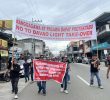DAVAO CITY – Fe Francisco, 56, is among those who lined up for free services during the women’s health fair sponsored by various organizations on Thursday.
Francisco, a resident of Lasang, said she wanted to have her eyes checked by doctors for blurred vision. She has no eyeglasses.
She said she would also like to have a free shot of pneumococcal vaccine after her eye checkup.
Francisco said because of limited resources, she only avails free health services.
“Wala gyud koy ika-afford mao nang naningkamot ko nga maka-avail aning medical mission (I have no money so i have to avail of the medical mission),” Francisco said.
Francisco worked as a lady guard for 20 years but now she and her husband are jobless.
Emelyn Sanchez, 25, also lined up to get free cervical cancer screening. She brought along her two kids, aged one and three.
Sanchez narrates that she has been experiencing pain on her waistline and suffers from constipation.
Her husband earns P10,000 a month but is “only enough for their most basic needs.”
“Una gyud namong paliton ang bugas, dayon de-lata ug biskwit sa mga bata (We prioritize buying rice, canned goods and biscuits for the kids),” Sanchez said adding that she is worrying now because her eldest will be going to school soon.
Sanchez said she does not include her medical check-ups in the list of budget priorities.
“Kung naa ray libre sa barangay moadto mi (If there are free services in the barangays we avail them),” she said.
Single parent of four kids Marivic Egot, 46 years old, also brought her children to avail free haircuts. She said she hopes to also avail free school supplies for them during the fair.
Egot, who works as a manicurist, said she earns P300 a day by going from house to house. On rare occasions she earns P500.
“Pero pangkaon ra gyud na namo (But that will only be spent for our food),” Egot told Davao Today.
Egot said she only avails free medical check-ups and would only self-medicate when she is ill.
She said she suffers from high blood sugar and high blood pressure.
Hundreds of women availed free health services including pap-smear, IUD insertion and removal, pre-natal check-ups, optical and bone screening, and dental services held at the Davao Medical School Foundation compound. Lectures on alternative and herbal medicine and HIV-AIDS awareness were also held.
Dr. Darlene Estuart, chairperson of the Reproductive Health (RH) Network here, said free services happens only “once or twice” a year and many women avail them.
Estuart said privatized health services entails cost.
“If you go to the public sector, it’s supposed to be free, it’s available in the health center. Maybe for some reason they cannot go there,” Estuart said, adding that it is a common experience that women do not usually prioritize their health care because “health centers might be far from them and they are busy in their homes”.
“But on a daily basis, these services should always be available,” she said.
Lyda Canson, chairperson emeritus of Gabriela Davao, said the influx of women from poor communities like Fe and Marivic during the health fair shows that a lot of women “wants free health services”.
“They came as early as 7:00 am to line up,” Canson said adding that it shows that there is lack of health services for women.
Canson explains that this year’s commemoration of the International Day of Action for Women’s Health focuses on “institutional violence”.
“It refers to not giving services, health services to women,” Canson said.
Canson said the Philippine government is signatory to International Conference on Population and Development and Belgium Platform Action for Women which commits to focus on women’s health.
“Although ang gobyerno kasama namin dito to give services, we engage them (Although we have government agencies here, we engage them to give services),” Canson said. However, she said that the state is still “the leading violator of the women’s right to health.”
“First, they cannot fully implement the RH Law which was passed on 2012. Because their people lack knowledge and they need to be trained. But the government has no funding for their trainings so they are looking for civil-society organizations to train their people on reproductive health,” she said.
Canson said, because of privatized health services, patients are forced to pay hospital bills “from their own pocket.”
Canson said if the government will spend for health “they can be efficient and effective”.
Gabriela Women’s Partylist Representative Luzviminda Ilagan said women’s health is very important.
“We are the mothers, we give birth,” she said adding that the Philippines has a very high mortality rate.
Ilagan cited a survey released by the Food and Nutrition Research Institute (FNRI) that reveals that one of every four pregnant Filipino mothers are nutritionally at risk.
The same survey also reveals that the incidence of malnutrition increases among the younger mothers and especially among those in the lowest income brackets.
Almost four out of ten or 37.2% of young pregnant women aged 20 years old and below are nutritionally at risk. The prevalence of malnutrition among women in the lower income bracket is at 30% and 14.4% among women in the higher income brackets.
“Amid such malnutrition and poverty exacerbated by the inaccessibility of healthcare services, it is not surprising that maternal mortality rate in the Philippines is now at 221 for every 100,000 live births,” said Ilagan.
Ilagan said the government’s failure to address the increases in the price of rice and other food items has reduced staple food for a majority of Filipino women and their children to instant noodles and canned goods.
“We should continuously bring attention to the lack of services and bring attention to government policies that are detrimental to women like privatization,” she said. (davaotoday.com)








